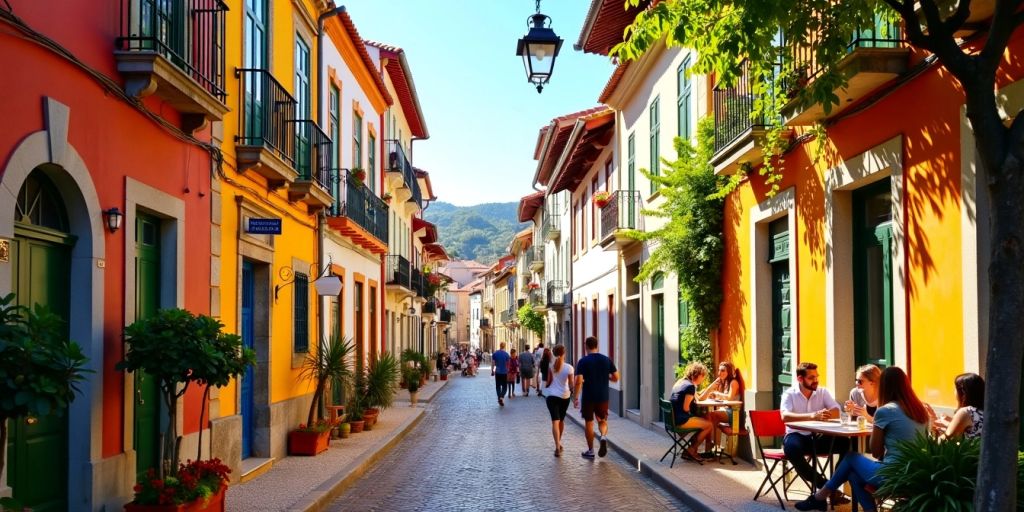Adapting to Portuguese Culture
Engaging with Locals
- Join local events to meet people.
- Learn basic Portuguese phrases to connect better.
- Visit cafes to experience daily life.
Participating in Festivals
- Attend traditional festivals to enjoy local culture.
- Try local foods at these events.
- Join in dances and music to feel included.
- Dress modestly when going out.
- Be polite and greet people warmly.
- Respect family values and social gatherings.
Public Healthcare Options
Portugal has a public healthcare system called SNS. It provides care to all residents. Here are some key points:
- Free services for EU citizens with an EHIC.
- Small fees for visits and prescriptions.
- High-quality care, ranked 12th by WHO.
Private Health Insurance
Many expats choose private health insurance. It offers quicker access to services. Consider these benefits:
- Immediate access to doctors.
- Coverage for specialists and treatments.
- Flexibility in choosing healthcare providers.
Finding a Local Doctor
Finding a local doctor is essential. Here’s how to do it:
- Ask for recommendations from locals or expats.
- Check online reviews for nearby clinics.
- Visit a few offices to see which feels right.
Navigating the healthcare system in Portugal can be easy with the right information. Get the inside scoop on healthcare in Portugal for expats to help you navigate the Portuguese healthcare system with confidence.
Finding Accommodation in Portugal
Finding a place to live in Portugal can be exciting. Here are some tips to help you:
Renting vs. Buying
- Renting is often easier for newcomers.
- Buying can be a good investment if you plan to stay long-term.
- Consider your budget and needs before deciding.
Popular Neighborhoods
- Explore areas like Lisbon, Porto, and Faro.
- Look for neighborhoods that fit your lifestyle.
- Check local amenities, schools, and transport options.
Setting Up Utilities
- Once you find a place, set up utilities like water and electricity.
- Research local providers for internet and phone services.
- Make sure to have all necessary documents ready.
Finding long-term rentals in Portugal is simple. Use websites like Idealista to search for properties. Happy house hunting!
Managing Finances and Banking
Opening a Bank Account
To open a bank account in Portugal, you need:
- A valid photo ID, like a passport.
- Proof of your address, such as a rental agreement.
- An NIF (Número de Identificação Fiscal) from the tax office.
- Proof of employment or student status if applicable.
Understanding the Tax System
Portugal has a unique tax system. Here are some key points:
- Residents must pay taxes on worldwide income.
- Non-residents are taxed only on income earned in Portugal.
- Familiarize yourself with tax rates and deadlines.
Budgeting for Daily Expenses
Managing your money is crucial. Consider these tips:
- Track your monthly spending to identify areas to save.
- Set aside funds for unexpected costs.
- Use budgeting apps to help manage your finances.
Living in Portugal can be rewarding. By mastering the art of working remotely in Portugal, you can enjoy a fulfilling life while managing your finances effectively.
Joining Expat Groups
- Look for local expat groups on social media.
- Attend meetups to connect with others.
- Join clubs that match your interests.
Participating in Community Events
- Check local calendars for festivals and fairs.
- Volunteer for community projects.
- Attend workshops to learn new skills.
- Use platforms like Facebook to find groups.
- Follow local events on Instagram.
- Share your experiences to meet others.
Learning the Portuguese Language
Language Courses
- Enroll in local language classes.
- Look for online courses that fit your schedule.
- Join community colleges offering Portuguese.
Practicing with Locals
- Engage in conversations with Portuguese speakers.
- Attend language exchange meetups.
- Volunteer in local events to practice speaking.
Using Language Apps
- Download apps like Duolingo or Babbel.
- Set daily goals for practice.
- Use flashcards for vocabulary building.
Learning Portuguese is vital for a smooth transition. It helps you connect with locals and understand the culture better. Embrace the language to truly enjoy your time in Portugal. This will enrich your experience and help you feel at home. Remember, practice makes perfect!
Handling Bureaucracy and Paperwork
Moving to Portugal involves a lot of paperwork. Here are some key points to keep in mind:
Visa and Residency Requirements
- Get the right visa before arriving. Common types include work, student, and retirement visas.
- Apply for a residence permit once you’re in Portugal. This is done through the Immigration and Borders Service.
- Prepare necessary documents like proof of employment and financial records.
- Familiarize yourself with local laws. Each region may have different rules.
- Be ready for appointments. Some processes require in-person visits.
- Stay patient. The bureaucracy can be slow, so don’t rush.
Dealing with Paperwork and Appointments
- Keep all documents organized. This includes your passport, visa, and any permits.
- Use a checklist to track what you need for each appointment.
- Consider hiring a local expert to help with complex paperwork. They can guide you through the process.
Remember, dealing with bureaucracy can be one of the biggest nuisances for expats. Stay persistent and organized to make it easier.
